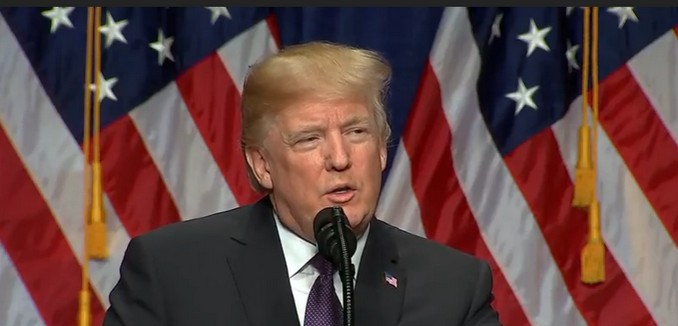In his speech on Monday, outlining America’s national security strategy, U.S. President Donald Trump reiterated his commitments to supporting peace efforts between Israel and the Palestinians as well as fighting Iran’s “malign influence.”
The President highlighted that regional dynamics have overtaken the peace process. “For generations, the conflict between Israel and the Palestinians has been understood as the prime irritant preventing peace and prosperity in the region,” Trump said. “Today, the threats from jihadist terrorist organizations and the threat from Iran are creating the realization that Israel is not the cause of the region’s problems,” he added.
This observation rejects positions expressed by Trump’s predecessor, Barack Obama, who told Jeffrey Goldberg of The Atlantic in 2008, that the Israeli-Palestinian is a “constant sore,” which “does infect all our foreign policy.”
Trump further noted that “states have increasingly found common interests with Israel,” in confronting terrorist threats in the region as evidenced by a recent delegation of Bahrainis, sent by the Gulf state’s king to bring a message of peace to Israel, and recent outreach between Israelis and Saudis.
Nonetheless, Trump also asserted that he was “committed” to achieving peace between Israel and the Palestinians. His recent announcement to recognize Jerusalem as Israel’s capital and to move the embassy there, had no impact on the final status of Jerusalem, which remains for the parties on the ground to negotiate, nor was it a departure from the U.S.’ commitment to help negotiate two states for two people.
Regarding Iran, Trump said that the U.S. would “work with partners to deny the Iranian regime all paths to a nuclear weapon and neutralize Iranian malign influence.” He described the 2015 nuclear accord between the Islamic Republic and world powers an “incomprehensibly bad deal”, which would have always collapsed under its own weight.
He also called Iran “the world’s leading state sponsor of terrorism” and said the country was openly calling for our destruction.” Trump further observed that Iran was threatening other nations through its proxies and warned that it was developing “more capable ballistic missiles and has the potential to resume its work on nuclear weapons.” Iran continues testing ballistic missiles and shipping arms to its allies in defiance of U.N. Security Council resolution 2231.
In addition, the President vowed that “the United States also works with allies and partners to deter and disrupt other foreign terrorist groups that threaten our homeland- including Iranian-backed groups such as Lebanese Hizballah.”
Speaking at the 2017 Reagan National Defense Forum in California, Lt. Gen. H. R. McMaster said that “about 80 percent of Assad fighters are Iranian proxies in Syria to establish a land bridge over into the Mediterranean,” as he warned of the “prospect of Iran having a proxy army on the borders of Israel.” Last month, Iranian-aligned Houthi rebels reportedly fired a missile at a Saudi airport and in October, Iranian-backed militias captured much of the Kurdistan Regional Government areas in Iraq.
[Photo: ABC News / YouTube ]




